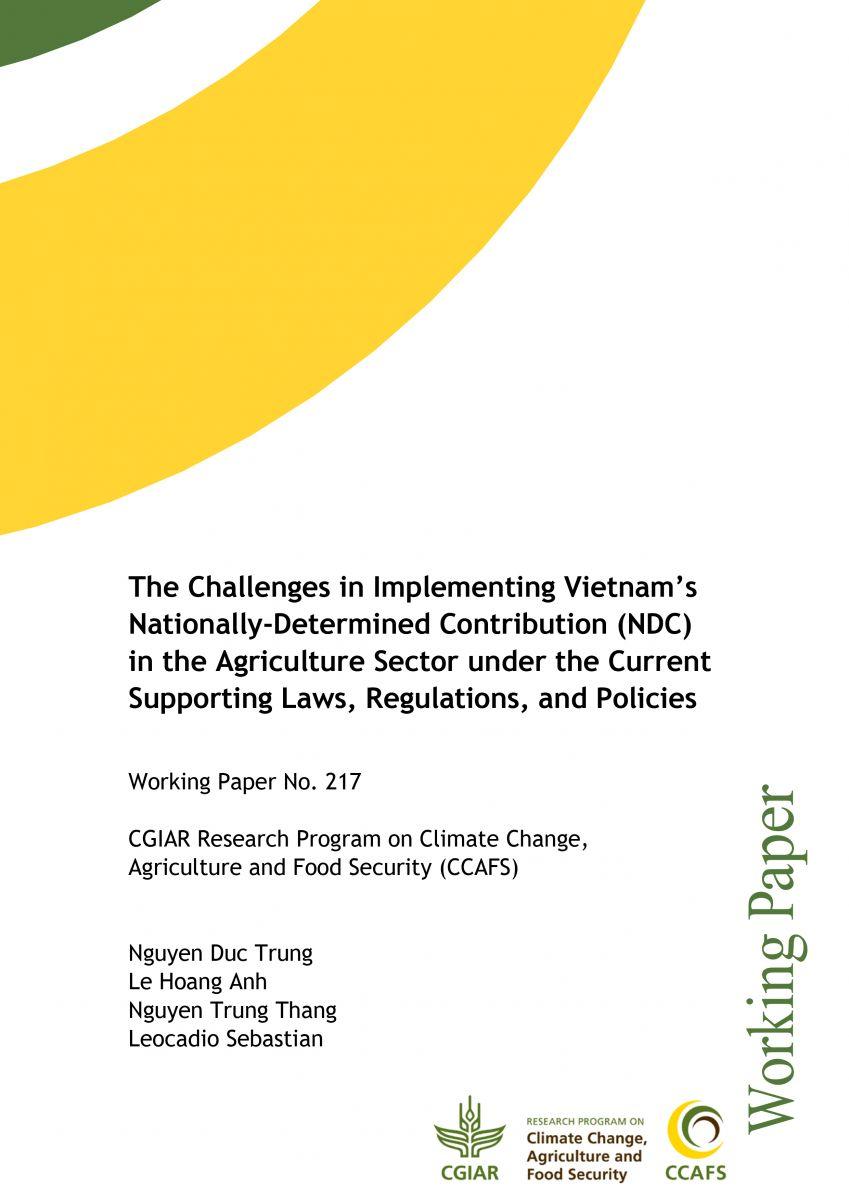Solutions to overcome legal barriers in the NDC implementation

Addressing the existing gaps in the five key areas of NDC implementation will ensure that Vietnam’s legal and institutional frameworks can support the NDC implementation by the time it is fully implemented in 2020.
Vietnam joined the ranks of countries which ratified the Paris Climate Agreement, committing to reduce its greenhouse gas emissions (GHG) by up to 25% by 2030 in its Nationally Determined Contributions (NDC) plan. The Vietnamese government has developed and implemented several laws, national strategies, policies, and regulations on climate change adaptation and mitigation which built strong foundation to achieve this goal.
Since agriculture is one of the biggest contributors to GHG emissions, effective implementation of the NDC activities on this sector is crucial in achieving the 2030 goals. With only two years left before the full-blown implementation of the plan, conducting an analysis of the existing legal and institutional framework is crucial in foreseeing challenges and resolving them beforehand.
To respond to this call, the CGIAR Research Program on Climate Change, Agriculture and Food Security (CCAFS) conducted a study to determine the barriers on Vietnam’s current legislation, policies, and institutional setup. The working paper of the study provided recommendations to ensure that policies can support the NDC implementation in these key areas: awareness, knowledge and technical capacity; coordination; downscaling to provincial level; engagement of private sectors and NGOs; and regulatory framework. The findings of this study will help the Vietnam’s Ministry of Agriculture and Rural Development (MARD) in implementing the NDC activities in the agriculture sector.
Key findings
Based on the interviews and analyses conducted, it was found out that Vietnam has a strong legal framework which serves as a foundation for implementing the NDC. The Law on Environment Protection, which is the main law for the NDC implementation, is supported by the National Action Plan to Respond to Climate Change, the National Action Plan to Implement NDC (Paris Agreement), and the National Action Plan for Green Growth, and other laws and local action plans.
Despite the presence of these legal instruments, the existing legal instruments and strategies are effective only for implementation at the national level. Hence, MARD, and the other agencies involved in implementing the NDC plan, still has a long way to go in terms of downscaling activities and plans at the provincial and sub-sector levels.
Apart from this, they still have to overcome several challenges to guarantee a smooth-sailing implementation of the NDC plan. For instance, the awareness of government officials and farmers on climate change mitigation measures and NDC still remains low. Moreover, there is a lack of policies providing incentives to the private and development sectors to actively participate in climate change response activities.
The technical and infrastructure limitations and the lack of human resources also hinder effective monitoring of GHG emissions. By harmonizing the three implementation plans with the socio-economic development plan, the overlaps in the action plans which resulted to inefficiencies in using financial and human resource for similar and related activities will be resolved.
Steps to be taken
Resolving the knowledge gap among stakeholders is one of first steps in successfully mobilizing human resources to resolve issues in other key areas of implementation. Hence, the study recommended MARD, through its Department of Science, Technology, and Environment, to conduct information campaigns on GHG emission reduction stated in the NDC plan among farmers, government officials and other stakeholders. Enhancing the institutional arrangements within MARD and their coordination with local and foreign institutions providing support would also improve efficiency.
In addition, implementers’ attention should be drawn towards establishing context-specific provincial plans with a clear set of instructions for implementation at the provinces and sub-sectors. Conducting feasibility studies and further analyses of policies will help in developing incentive mechanisms to encourage active participation of all stakeholders and in improving the regulatory framework to guarantee the achievement of the goals in the NDC plan.
Download the working paper: Trung, N.D., Anh, L.H., Thang, N.T., and L.S. Sebastian, 2017. The Challenges in Implementing Vietnam’s Nationally-Determined Contribution (NDC) in the Agriculture Sector under the Current Supporting Laws, Regulations, and Policies. CCAFS Working Paper No. 217. Wageningen, the Netherlands: CGIAR Research Program on Climate Change, Agriculture and Food Security (CCAFS).
Read more:
- CCAFS blog: To meet climate goals, mainstream climate change mitigation in agricultural finance
- CCAFS blog: Vietnam’s Large Field Models and the potential of climate-smart agriculture
- CCAFS blog: Climate experts identify building blocks of Vietnam’s mitigation actions in rice
Camille Anne Mendizabal is the junior communications specialist for the World Agroforestry Centre Philippines. She is also a communication consultant with the CCAFS Southeast Asia program.




